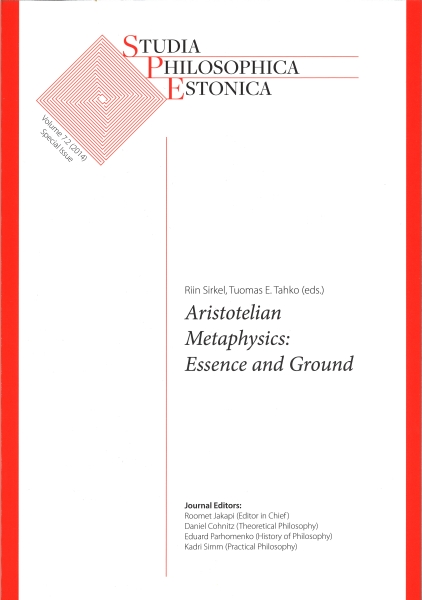The Causal Priority of Form in Aristotle
DOI:
https://doi.org/10.12697/spe.2014.7.2.07Keywords:
matter, form, cause, principle, priority, substanceAbstract
In various texts (e.g., Met. Z.17), Aristotle assigns priority to form, in its role as a principle and cause, over matter and the matter-form compound. Given the central role played by this claim in Aristotle's search for primary substance in the Metaphysics, it is important to understand what motivates him in locating the primary causal responsibility for a thing's being what it is with the form, rather than the matter. According to Met. Theta.8, actuality [energeia/entelecheia] in general is prior to potentiality [dunamis] in three ways, viz., in definition, time and substance. I propose an explicitly causal reading of this general priority claim, as it pertains to the matter-form relationship. The priority of form over matter in definition, time and substance, in my view, is best explained by appeal to the role of form as the formal, efficient and final cause of the matter-form compound, respectively, while the posteriority of matter to form according to all three notions of priority is most plausibly accounted for by the fact that the causal contribution of matter is limited to its role as material cause. When approached from this angle, the work of Met. Theta.8 can be seen to lend direct support to the more specific and explicitly causal priority claim we encounter in Met. Z.17, viz., that form is prior to matter in its role as the principle and primary cause of a matter-form compound's being what it is.
Downloads
References
Barnes, J. (1999). Review of S. Everson, Aristotle on Perception, Classical Review 49: 120-122.
Barnes, J. (ed.) (1984). The Complete Works of Aristotle: The Revised Oxford Translation, Princeton University Press.
Barney, R. (2008). Aristotle’s argument for a human function, Oxford Studies in Ancient Philosophy 34: 293-322.
Bolton, R. (1978). Aristotle’s definitions of the soul: De Anima II, 1- Phronesis 23: 258-278.
Bos, A. P. (2003). The Soul and Its Instrumental Body: A Reinterpretation of Aristotle’s Philosophy of Living Nature, Brill, Leiden.
Bostock, D. (ed.) (1994). Aristotle, Metaphysics, Books Z and H, Clarendon Press, Oxford.
Burnyeat, M. (1979). Notes on Book Zeta of Aristotle’s Metaphysics, Study Aids Monograph No.1.
Burnyeat, M. (2001). A Map of Metaphysics Zeta, Mathesis Publications, Pittsburgh.
Burnyeat, M. (2008). Aristotle’s Divine Intellect, Marquette University Press, Milwaukee.
Corkum, P. (2008). Aristotle on ontological dependence, Phronesis 53: 65- 92.
Fine, G. (1987). Forms as causes: Plato and Aristotle, in A. Graeser (ed.), Mathematics and Metaphysics in Aristotle, Verlag Paul Haupt, Bern, pp. 69-112.
Frede, M. (1994). Aristotle’s notion of potentiality in Metaphysics Theta, in T. Scaltsas, D. Charles and M. L. Gill (eds), Unity, Identity and Explanation in Aristotle’s Metaphysics, Clarendon Press, Oxford, pp. 173-193.
Frede, M. (2008). Aristotle on thinking, Rhizai 2: 287-301.
Frede, M. and Patzig, G. (eds) (1988). Aristoteles Metaphysik Z, Verlag C.H. Beck, Munich.
Johansen, T. K. (2012). The Powers of Aristotle’s Soul, Oxford University Press, Oxford.
Johnson, M. R. (2005). Aristotle on Teleology, Oxford University Press, New York.
Koslicki, K. (1997). Four eighths hephaistos: Artifacts and living things in Aristotle, History of Philosophy Quarterly 14: 77-98.Kathrin Koslicki 141
Koslicki, K. (2006). Aristotle’s mereology and the status of form, Journal of Philosophy CIII: 715-736.
Koslicki, K. (2008). The Structure of Objects, Oxford University Press, Oxford.
Koslicki, K. (2012). Essence, necessity and explanation, in T. Tahko (ed.), Contemporary Aristotelian Metaphysics, Cambridge University Press, Cambridge, pp. 187-206.
Koslicki, K. (2013). Ontological dependence: An opinionated survey, in B. Schnieder, M. Hoeltje and A. Steinberg (eds), Varieties of Dependence (Basic Philosophical Concepts), Philosophia Verlag, München, pp. 31-64.
Koslicki, K. (2014). In defense of substance, Grazer Philosophische Studien. forthcoming.
Lennox, J. G. (2008). ‘As if we were investigating snubness’: Aristotle on the prospects for a single science of nature, Oxford Studies in Ancient Philosophy 35: 149-186.
Makin, S. (ed.) (2006). Aristotle, Metaphysics, Book Theta, Clarendon Press, Oxford.
Peramatzis, M. (2008). Aristotle’s notion of priority in nature and substance, Oxford Studies in Ancient Philosophy 35: 187-247.
Peramatzis, M. (2011). Priority in Aristotle’s Metaphysics, Oxford University Press, New York.
Ross, W. D. (ed.) (1924). Aristotle, Metaphysics: A Revised Text with Introduction and Commentary, Clarendon Press, Oxford.

